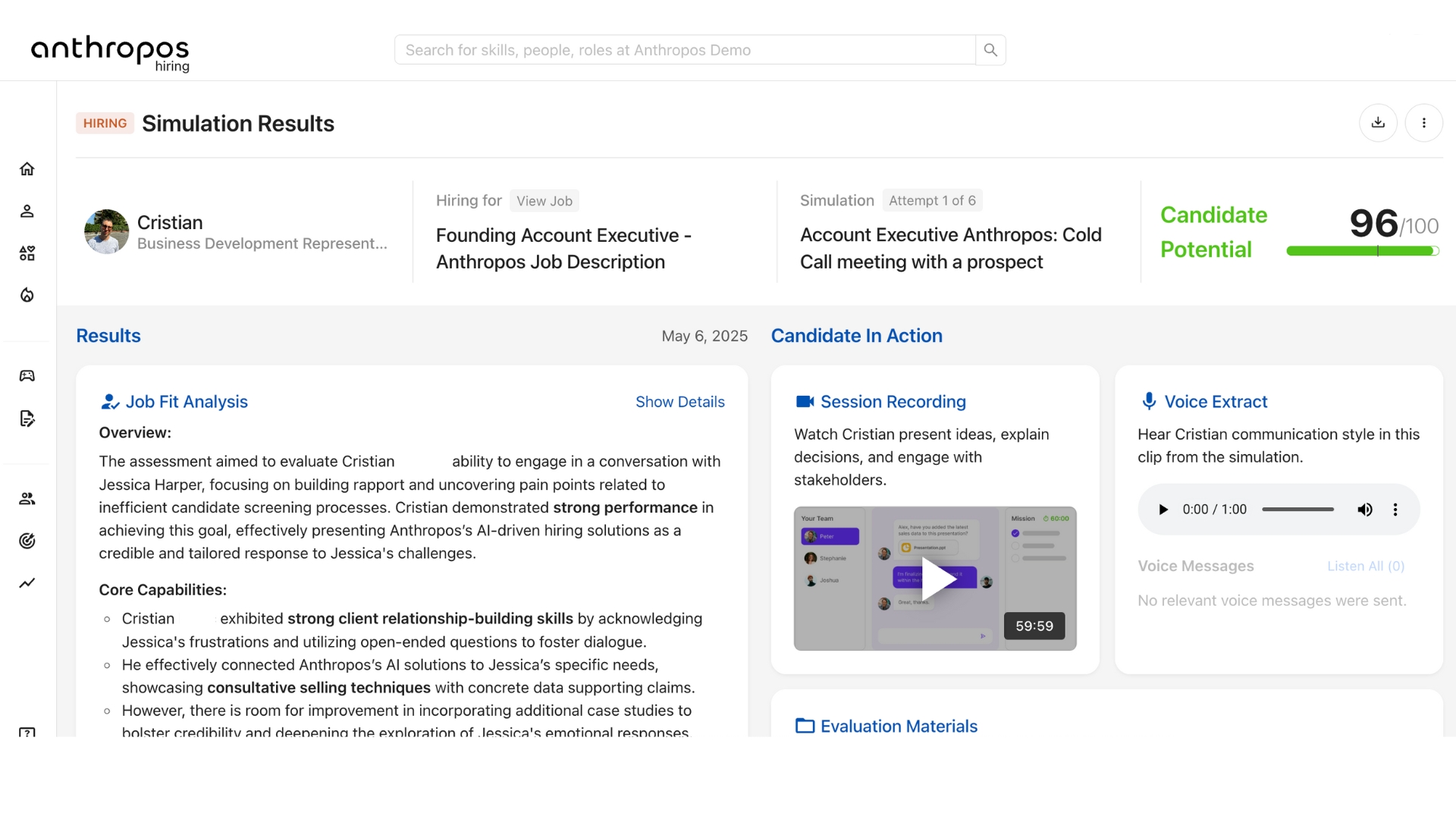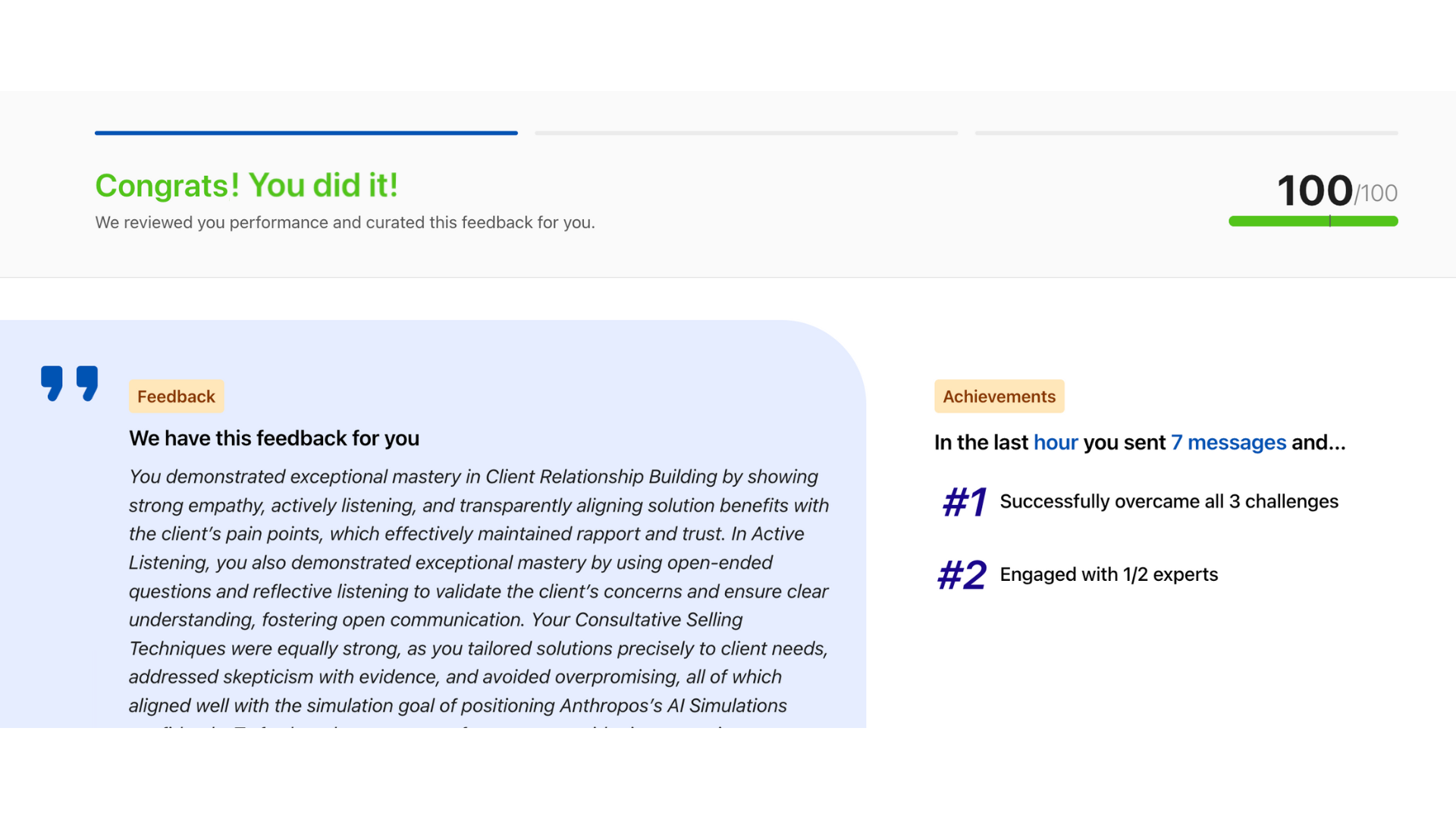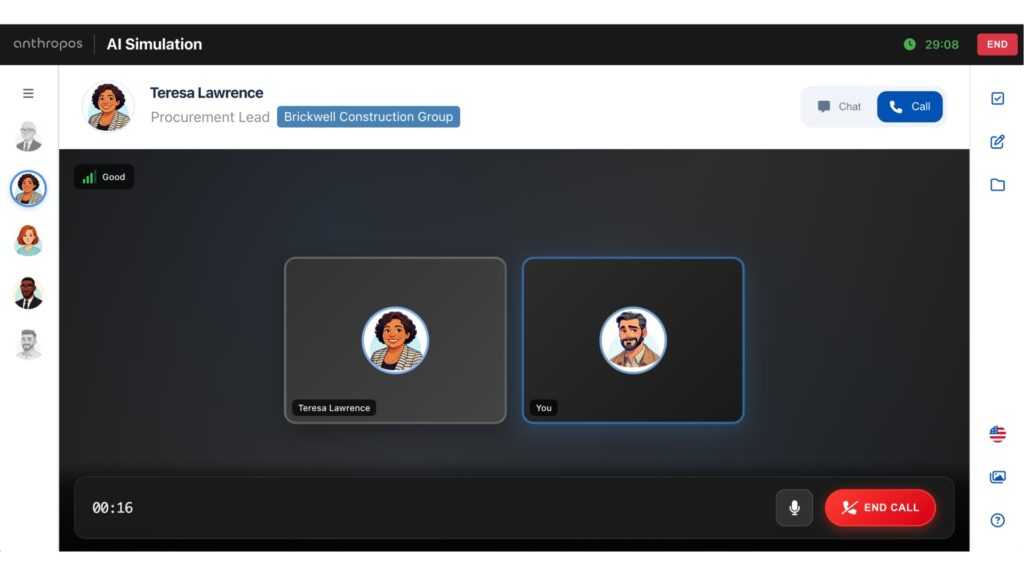Hiring salespeople has always been one of the most complex and costly challenges for growing companies.
Sales roles are uniquely demanding: they require deep product knowledge, communication finesse, mental resilience, and an ability to operate under pressure — all at once.
Yet, most hiring processes still rely on resumes and interviews to evaluate those capabilities.
Today, with generative AI making it easy for candidates to create polished, keyword-optimized CVs, it’s nearly impossible to tell who’s actually ready to perform.
A strong resume might signal confidence or experience, but it doesn’t prove whether someone can prioritize leads, navigate objections, or close deals in real conditions. And when the wrong hire slips through, companies don’t feel the pain right away — they feel it three to six months later, once revenue’s been missed, time has been lost, and the team is forced to reset.
Interviews don’t solve the problem either
Interviews are supposed to fill the gaps left by resumes — but when it comes to sales, they rarely give you the full picture.
A great salesperson is, by definition, good at presenting themselves. They can charm their way through tough questions, handle objections smoothly, and tell a compelling story. And while those are useful skills, they don’t guarantee execution.
Many sales leaders know the feeling of being wowed in an interview, only to watch that same candidate struggle to hit quota once the job begins. That disconnect comes from relying too heavily on conversation instead of context.
In a live sales environment, things move quickly, unpredictably, and under pressure. Prospects don’t stick to a script. Systems aren’t perfect. Leads aren’t always qualified. Interviews don’t simulate those conditions — and they don’t show how a person prioritizes, adapts, or recovers from rejection. Yet we continue to base multi-thousand-dollar hiring decisions on these limited impressions. And when it doesn’t work out, it’s not just a productivity issue — it’s a financial loss, a morale drain, and often a delay in your broader growth goals.
Where Anthropos Comes In
Anthropos was designed to replace that guesswork with clarity — especially for roles where soft skills, judgment, and execution matter as much as raw experience.
With Anthropos Hiring, companies assess candidates using real-life simulations tailored to sales roles. These AI-based job simulations don’t test generic selling knowledge. They reflect what the job actually looks like: following up on a lead who’s gone cold, responding to tough objections in writing, deciding which opportunities to prioritize when time is limited, or navigating a client conversation with multiple stakeholders.
Everything happens in a realistic, digital environment that feels natural to the candidate and rich in signal for the hiring team. And the results aren’t vague or superficial.
Hiring managers receive structured, easy-to-read reports that show how each candidate communicates, reasons, reacts under pressure, and aligns with the actual challenges of the role.

This creates a shared language between recruiters and team leads, removes bias from the decision process, and gives everyone confidence that they’re not just hiring potential — they’re hiring performance.
Most importantly, Anthropos does this at scale, without slowing down your pipeline. Whether you’re screening 50 SDRs or filling a single high-stakes AE role, you’re operating with more insight — and less risk.
Why the Candidate Experience Matters Too
The traditional hiring process for sales roles is often grueling for candidates.
They apply, wait, sometimes never hear back, and when they do, the process may involve long interviews that still fail to explain what the job actually entails. Candidates — especially high-potential ones — are increasingly tired of vague role descriptions and subjective evaluation. Anthropos flips that experience.
Through realistic simulations, candidates engage with meaningful tasks that mirror the actual responsibilities they’d have in the role. That alone helps them decide if the position is a good fit.
But we go further. Every candidate receives personalized feedback at the end of their assessment. And those who aren’t selected aren’t left empty-handed — they get free access to a library of 250+ simulations to continue developing their skills.
For your company, this means even rejected candidates walk away with a positive impression of your brand. For hiring managers, it means better data and better buy-in from candidates who accept the offer knowing exactly what they’re stepping into. In a competitive talent market, that’s a huge advantage — and it helps close the gap between hiring and retention.

Hiring Salespeople Shouldn’t Be a Gamble
Every quarter, sales targets loom. Your product may evolve.
The market shifts. But one constant remains: you need the right people selling at the right time. In this context, hiring can’t be a gamble.
Relying on resumes that can be AI-written or interviews that reward storytelling over substance is no longer sustainable. Anthropos offers a different path — one where you see people in action before you make the hire.
You observe how they solve problems, how they communicate, how they handle stress, and how they navigate ambiguity. You’re not hiring based on what they say they’ve done — you’re hiring based on what you’ve seen them do.

This isn’t just a better hiring process — it’s revenue protection. It’s a safeguard against lost quarters and costly ramp-up failures. If you’re serious about building a high-performing sales team, it starts with changing how you assess talent.
Anthropos makes that shift not only possible, but practical — and it starts with one simulation.
Book a demo and let us show you how.
It may also interest you
A blog to rethink work and career
This blog wants to help you understanding how to improve your career, acquire new skills, move to new industries and in general, how to deal with your job and think about it in your career context.
You can also find all the updates and news features of Anthropos.
If you feel this is helpful, sign-up for our newsletter, Square One.